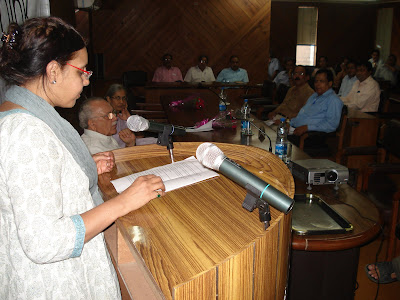 Rabbi Gavriel Noach Holtzberg and Mrs. Rivka Holtzberg, who were killed in the 26/11/2008 Mumbai Terrorist Attack on the Chabad House there. The lecture was organised in their memory and also in memory of everybody else killed in the attacks.
Rabbi Gavriel Noach Holtzberg and Mrs. Rivka Holtzberg, who were killed in the 26/11/2008 Mumbai Terrorist Attack on the Chabad House there. The lecture was organised in their memory and also in memory of everybody else killed in the attacks. From the left: Prof. A. K. Singh, Director, Giri Institute of Development Studies, Lucknow, Prof. Roop Rekha Varma, Secretary, Saajhi Duniya (NGO) and Prof. Deepika Marya, University of Southern Maine, Portland, Maine, USA
From the left: Prof. A. K. Singh, Director, Giri Institute of Development Studies, Lucknow, Prof. Roop Rekha Varma, Secretary, Saajhi Duniya (NGO) and Prof. Deepika Marya, University of Southern Maine, Portland, Maine, USA Prof. A. K. Singh, Director, Giri Institute, introducing the speaker, Prof. Deepika Marya, Univ. of Southern Maine
Prof. A. K. Singh, Director, Giri Institute, introducing the speaker, Prof. Deepika Marya, Univ. of Southern Maine Prof. Marya being felicitated by a Research Fellow of the Giri Institute of Development Studies, Lucknow
Prof. Marya being felicitated by a Research Fellow of the Giri Institute of Development Studies, Lucknow



 Two-year-old Moshe who lost his parents, Rabbi Gavriel Noach Holtzberg & Mrs. Rivka Holtzberg, to the 26/11/2008 Mumbai Terrorist Attacks
Two-year-old Moshe who lost his parents, Rabbi Gavriel Noach Holtzberg & Mrs. Rivka Holtzberg, to the 26/11/2008 Mumbai Terrorist Attacks"The crises experienced by the people of Mumbai during and after the terrorist attacks on 26/11 have taught us that we can no longer rely on the state to respond to take control and provide safety for the general population. When the state fails to act responsibly it is left to the citizens to come forward with strategies to understand and handle the crisis; where did it emerge from, what were the factors that inflamed it and what will it take to eradicate it in the most constructive way," said Prof. Deepika Marya on Thursday, 16th July, 2009, in a lecture she gave on "26/11 Mumbai and the Radical Project of Secularism", jointly organised by Open Space - Lucknow and the Giri Institute of Development Studies, Lucknow, at the institute's main auditorium, in memory of Rabbi Gavriel Holtzberg and Mrs. Holtzberg and everybody else killed in the 26/11 Mumbai attacks.
Prof. Marya teaches Postcolonial Theory in the English Department at the University of Southern Maine, Portland, Maine, USA. She has been active in the field of Conflict Resolution since 1994 and has consulted at numerous colleges, universities, and public and private schools across the US, leading trainings and workshops on Conflict Resolution and Social Justice. She has originated the use of critical theory in mediation training and intervention.
Prof. Marya said, "Based on the work of Rohana and Karper, who have worked in societies that are perpetually torn apart, one could suggest that in cases of sudden, unexpected terrorist attacks on the scale of 26/11, conflict reduction remains out of reach if we keep blaming the 'perpetrators' for all the ills of society and keep them out of the reconciliation process. In other words, to design justice and reconciliation after an an event such as 26/11, the community/nation needs to pay close attention to the group that is being held responsible for the crime. When reconciliation is designed 'at the top', which is to say responding to the needs of those with more power in society and does not dialogue with the group that is most interested in gaining that attention of the media, society and the world, it fails in its purpose." Prof. Marya also added, It is also a moot point that who should design what the process should be and who should carry it out. Holding a person in custody and hanging them is only one form of 'justice'. When that happens the state becomes part of the problem and we get even further from the solution. The state can become a Trojan horse where large scale inquiries that are mandated lead to wrong people being accused or not enough evidence being produced that all parties are convinced. If resolving a deep rooted malaise, whether it be communal disharmony or related to any other societal inequity requires we ask the state to be accountable for its role in perpetuation of the problem, it needs to involve the lower powered group, the one that feels targeted, and step back to ask ourselves as a community what do we mean by justice. Do we feel justice has been done by punishing the lone surviving attacker and pointing fingers at another country for harboring terrorists?"
The programme was presided over by eminent social activist Prof. Roop Rekha Varma, while the speaker was introduced by Prof. A. K. Singh, Director, Giri Institute of Development Studies, Lucknow. The vote of thanks was given by Open Space Fellow Dr. Navras Jaat Aafreedi.























1 comment:
so glad that people remember this tradgedy and are doing something good in their memory
Post a Comment